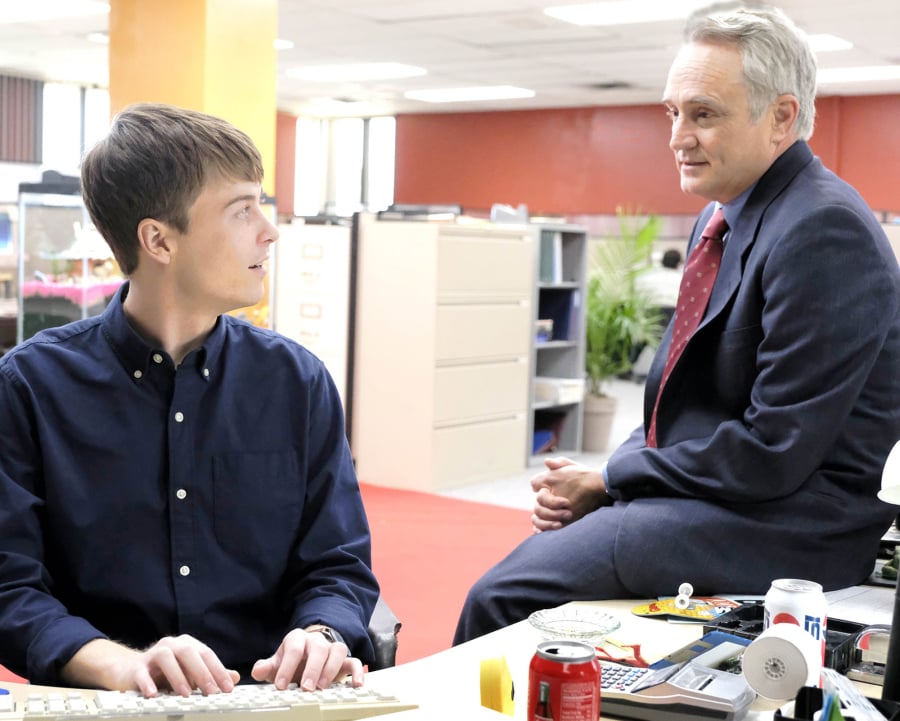BEVERLY HILLS, Calif. — Unfazed by the blue screen of death, they were dogged innovators who foresaw the possibilities of the internet way before anyone else. The story of the colorful entrepreneurs and their crusades with the new technology is the subject of the National Geographic Channel’s series “Valley of the Boom.”
The docudrama explores the naissance of Silicon Valley, social media, wireless streaming and the information avalanche that was to bury us all.
When it began it was filled with optimism, says Arianna Huffington, one of the show’s executive producers and an early proponent of the internet.
“The mood you’re going to see here (on the show) is a mood of idealism, triumphalism,” she says. “It was expected to basically change the world. And that’s why you had the first expression of real FOMO, you know, fear of missing out. Everybody wanted to be on the internet train even if they had no clue where that train was going.”
Actor Bradley Whitford (“The West Wing”) plays James Barksdale, CEO of Netscape, the web browser that wrestled with Microsoft for world dominance.
“The internet — for our particular world — certainly I can tell you it is a golden age for research as an actor because you can pull out your phone and see how somebody talked and walked through the entire span of their careers,” he says.
“I think this is the most spectacular time in storytelling with all the streaming services that the internet has provided and transformed Hollywood. What’s striking to me — going along with what Arianna said — is there is this idealism here in this naivete about the possibilities of this, very much like the birth of television, which was going to bring opera and art to the masses. Well, guess what? Communities of nursing mothers and Nazis. It’s a weird mix.
“And I feel like the internet’s been great for show business and we are just realizing the unintended consequences and how information — we live in the information age. It would be better for my kids if we lived in the wisdom age.”
Matthew Carnahan, series creator, says it’s difficult to gauge the internet’s influence. “It’s affected the way we assimilate information massively — information, entertainment, images — everything has become accelerated,” he says.
“There’s no such thing as ‘avant-garde’ or ‘underground’ anymore because it’s instantly digestible … I have a very particular bent, a very particular slant on it. But I would be interested to hear what Steph Paternot (has to say.)”
Stephan Paternot was one of the founders of TheGlobe.com, an early social networking service conjured nine years before Facebook. And while he acknowledges the internet has produced some insidious mutants, he thinks the pendulum is swinging back.
“And, first of all, I’m very humbled to have had the Globe story included in this series. There’s a lot of other pioneers out there. Maybe ours was iconic only because we had the rise and we had the fall … When we started it, there was a purity to it to create this global village where everybody would be connected, a sort of utopia. And of course, to execute these dreams requires massive amounts of capital,” he says.
“And this show really shows you the need for capital to marry the creativity so that things can be invented. But then it also shows the double-edged sword of the capital corrupting the original vision. And we’re finding ourselves right now in this unique situation where a lot of the good of the internet we’ve all experienced, but now we’re starting to see the bad, the echo chambers, the power assimilation by a handful of companies, net neutrality being pushed aside — so those big companies are getting even richer,” he says.
But Paternot thinks things are changing. “There’s a counter-option now, that’s beginning right now in our time, which is the beginning of Web 3.0 — decentralization, blockchain, crypto — all of these new things as a means to pull back and get rid of the fake news and take power away from all of these major companies,” he says. “And, so, I think this show, from my perspective, has become highly relevant at this exact moment in time.”
Huffington says the development of the internet also reduced what she calls “power structures.” “Because the browser gave everybody access to information, and information is power,” she says.



